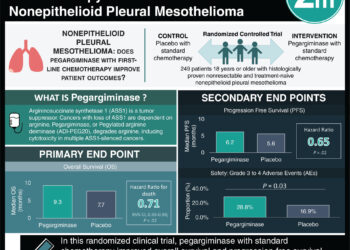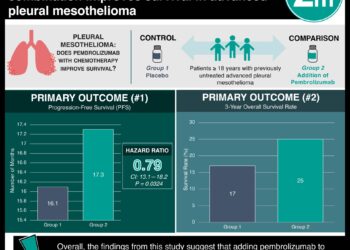Patient Basics: Mesothelioma
Originally published by Harvard Health.
What Is It?
Mesothelioma is a rare form of cancer that affects the thin membranes that line most of the body’s organs. In the lungs and chest cavity, this membrane is called the pleura. In the abdomen, it is called peritoneum. The membrane around the heart is called the pericardium. Mesothelioma most often affects the lungs.
Most cases of mesothelioma are caused by exposure to asbestos. Asbestos is a naturally occurring mineral. It was once used in a variety of industrial products including
- Insulation
- Cement
- Roof shingles
- Flooring
- Brake linings
People who made these products or worked in certain industries, such as ship building, have an increased risk of mesothelioma because they may have inhaled or swallowed dust containing asbestos particles. If they went home with dust on their clothing, family members may have been exposed to asbestos, too.
Some cases of mesothelioma have been linked to other causes. These include exposure to a radiation contrast dye used before 1960 to help blood vessels show up on x-rays. In a few cases, the cause is unknown.
People exposed to asbestos for a long time, or exposed to high levels of it, have an increased risk of mesothelioma. But even people exposed to asbestos for a short time can develop the disease. Smoking and being exposed to asbestos seems to raise a person’s risk even more.
Typically, the disease develops 20 to 40 years after asbestos exposure. People usually are diagnosed with mesothelioma between ages 50 and 70. More men than women get this cancer. That’s probably because men are more likely to have worked in industries that used asbestos.
Symptoms
Almost everyone diagnosed with mesothelioma in the lungs or chest experiences chest pain or shortness of breath as the first symptom. These symptoms can be caused by the cancer itself, which irritates nerve cells in nearby tissues. They can also be caused by fluid building up between the two layers of the pleura.
People with mesothelioma in the abdominal lining may have abdominal pain and swelling caused by fluid build-up there.
Other possible symptoms include
- A cough
- Fatigue
- Unexplained weight loss
Diagnosis
Your doctor will ask about your symptoms and other medical conditions you have had. He or she will then examine you.
Because mesothelioma symptoms can be caused by other medical conditions, your doctor will probably run a few tests. These tests include an electrocardiogram (ECG), to check your heart, and a chest or abdominal x-ray.
If these tests show abnormalities in the lungs or pleura, you will need a computed tomography (CT) scan or a magnetic resonance imaging (MRI) scan. These imaging studies help your doctor determine the size and location of any tumors in the chest or abdomen.
If you have fluid in your chest or abdomen, your doctor may use a needle or thin tube to remove a small sample of it for examination. (Fluid may also be drained to relieve chest pain and shortness of breath.) Occasionally, mesothelioma can be diagnosed from this fluid sample alone. But in most cases, your doctor will take a tissue sample (biopsy), too.
Depending on the tumor’s location, your doctor will make a small cut through the chest wall or into the abdomen. He or she will then insert a lighted tube through the incision to see the tumor and remove a tiny piece of it. Your doctor may also look for masses in your airways or remove lymph nodes.
Investigational blood tests that check levels of two chemicals—osteopontin and mesothelin—may help diagnose mesothelioma. (They may also assess a patient’s response to treatment.) Tests for these biomarkers are available as part of some clinical trials.
If your doctor diagnoses pleural mesothelioma, the next step is to determine the cancer’s stage. This is a measure of how far the tumor has spread. These are the stages of pleural mesothelioma:
- Stage I. The tumor is only in the lining on one side of the chest or diaphragm. There may be small spots on cancer on the lining of the lung. There are no signs that the cancer has spread to more distant sites.
- Stage II. The cancer involves one side of the chest or diaphragm, and it has grown into a large part of the lining of the lung, the diaphragm, or the lung itself. It has not spread to the lymph nodes or to distant sites.
- Stage III. The cancer affects one side of the chest, and it has grown into the chest wall or the outer covering of the heart. It may have spread to lymph nodes on the same side as the tumor, but not to other lymph nodes. It has not spread to distant sites.
- Stage IV. The cancer affects one or both sides of the chest. It has spread deep into the chest wall, through the diaphragm, into the spine, through the lining of the heart, or into the heart itself. It may have spread to lymph nodes and to distant sites.
Stage I also is called localized disease. Stages II, III, and IV are called advanced disease. If the disease returns after treatment, it is called recurrent mesothelioma.
Doctors don’t have a staging system for mesothelioma in the abdomen.
Expected Duration
Mesothelioma will continue to grow and spread until it is treated.
Prevention
To reduce your risk of mesothelioma, avoid asbestos. Because there is no safe level of exposure, any asbestos exposure is too much. Avoid cigarette smoking, especially if you have been exposed to asbestos.
Have an expert check your home for exposed insulation that contains asbestos and areas where asbestos is deteriorating. This is particularly important in older homes. The asbestos must be professionally removed or sealed off. Have the air quality checked carefully to make sure it is safe to go back into areas that once contained asbestos.
Workers who deal with asbestos-containing materials should wear protective equipment to limit their exposure—and to keep from bringing asbestos dust home on their clothing.
Treatment
Mesothelioma can occur either in the lung or in the abdominal cavity. In both places, mesothelioma is difficult to treat. The cancer can spread easily to nearby organs. If it has spread, it is nearly impossible to remove the entire tumor.
In addition to surgery, mesothelioma is primarily treated with radiation therapy and chemotherapy. There is no standard treatment for recurrent mesothelioma. Generally, treatments are considered that were not used the first time the disease was treated.
Surgery (for mesotheliomas that arise from the lung)
Before surgery is considered, your overall health will be evaluated. Tests are done to
- Make sure the cancer has not spread to distant sites
- See how well your lungs and heart are functioning
- Check for any signs of lung damage from tobacco or other diseases
These tests determine how risky surgery would be, especially if a lung needs to be removed.
Surgery for mesothelioma can be aimed at long-term control of the cancer (aggressive surgery) or relief of symptoms (palliative procedures).
Aggressive surgery involves removing the pleura, lung, diaphragm, and pericardium. The intent of this complicated surgery is to remove as much of the tumor as possible. Not all medical centers will do this procedure because it is so complex. Also, patients have a high risk of death in the month after surgery.
Surgeons typically perform aggressive surgery only in younger patients with good overall health and stage I disease. They evaluate patients carefully to make sure they can tolerate the surgery. Few patients have aggressive surgery.
When mesothelioma is advanced, palliative procedures can relieve or control symptoms. For example, doctors can relieve pain and breathlessness by draining fluid build-up in the chest or abdomen. Talc may be injected into the space to stop fluid from accumulating there. The pleura may also be removed to reduce pain caused by the tumor or to prevent fluid from building up.
If the disease is in the abdomen, surgery is generally aimed at relieving symptoms.
Radiation therapy
Doctors generally have a very difficult time delivering enough radiation to kill the tumor without damaging nearby organs. Lower doses of radiation can shrink the tumor, but it’s unclear whether this helps people live longer than if they were not treated.
Having radiation after surgery has not been shown to prolong survival. But because surgery is very unlikely to remove the entire tumor, radiation is often done in the hopes of killing any tumor cells left behind. Radiation therapy can also be used to relieve symptoms of mesothelioma, including chest pain.
Chemotherapy
Chemotherapy is the use of medication to treat cancer. Most chemotherapy drugs are injected into a vein. However, some doctors have started putting chemotherapy drugs directly into the abdomen or chest cavity. This strategy allows them to use higher doses of drugs and, in some cases, more effectively treat the cancer.
Chemotherapy cannot cure mesothelioma, but some drugs can help in some patients. Using more than one drug at a time may improve the patient’s response to the medications.
As with radiation therapy, chemotherapy may be given after surgery in an attempt to kill cancer cells that could not be removed.
Clinical trials and investigative treatments
New treatments for mesothelioma, along with a vaccine that might prevent the disease, are in clinical trials. Clinical trials evaluate the safety and effectiveness of new treatment before they are widely used. There are no guarantees that a new treatment will work, and there are some risks. However, researchers don’t start clinical trials unless they believe a treatment may have some value.
Some treatments for mesothelioma currently being studied include:
- Combination chemotherapy. Different combinations of chemotherapy drugs have been tried with mixed results.
- Intracavitary chemotherapy. Chemotherapy drugs are put directly into the chest or abdomen. As a result, much larger doses can be given to patients without causing severe side effects. Some studies have shown that this therapy can control fluid build-up and reduce tumor size.
- Brachytherapy (intracavitary radiation therapy). In this treatment, a radioactive substance is placed directly into the chest or abdomen.
- Multimodality therapy. This involves any combination of surgery, radiation therapy, and chemotherapy.
- Gene therapy. A genetically altered virus is put into the tumor. The virus infects cancerous cells and makes them vulnerable to anticancer drugs.
- Immunotherapy. These treatments stimulate the body’s immune system to fight cancer.
When To Call a Professional
Call your doctor right away if you have any symptoms of mesothelioma, such as shortness of breath or chest pain—especially if you have been exposed to asbestos.
Prognosis
Mesothelioma usually is advanced when it’s diagnosed, making the outlook poor. On average, patients live about one year after diagnosis.
Patients who have been treated successfully for mesothelioma are at increased risk for developing a second cancer, such as lung cancer.
Additional Information
National Cancer Institute (NCI)
NCI Public Inquiries Office
6116 Executive Blvd.
Room 3036A
Bethesda, MD 20892-8322
Toll-Free: 1-800-422-6237
TTY: 1-800-332-8615
http://www.nci.nih.gov/
American Cancer Society (ACS)
1599 Clifton Road, NE
Atlanta, GA 30329-4251
Toll-Free: 1-800-227-2345
TTY: 1-866-228-4327
http://www.cancer.org/
American Lung Association
61 Broadway, 6th Floor
New York, NY 10006
Phone: 212-315-8700
Toll-Free: 1-800-548-8252
http://www.lungusa.org/
National Heart, Lung, and Blood Institute (NHLBI)
P.O. Box 30105
Bethesda, MD 20824-0105
Phone: 301-592-8573
TTY: 240-629-3255
Fax: 301-592-8563
http://www.nhlbi.nih.gov/
National Institute for Occupational Safety and Health
395 E Street, SW
Suite 9256
Patriots Plaza Building
Washington, DC 20201
Toll-Free: 1-800-232-4636
Fax: 513-533-8347
http://www.cdc.gov/niosh/




